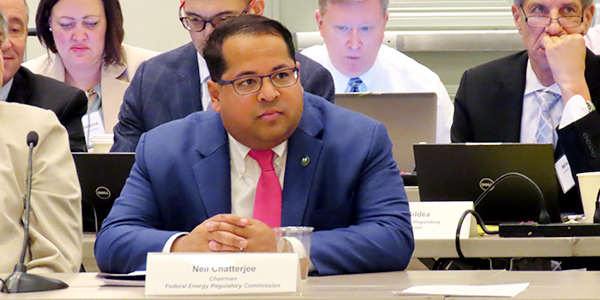FERC on Thursday approved the full retirement of four NERC reliability standards and the modification of five others, in the name of “[enhancing] the efficiency of the reliability standards program.” The updates will result in the retirement of 18 reliability standard requirements overall (RM19-16, RM19-17).
The four standards to be retired in their entirety are:
- FAC-013-2 — Assessment of transfer capability for the near-term transmission planning horizon;
- INT-004-3.1 — Dynamic transfers;
- INT-010-2.1 — Interchange initiation and modification for reliability; and
- MOD-020-0 — Providing interruptible demands and direct control load management data to system operations and reliability coordinators.
Additional requirement removals will lead to the following standards being modified:
- INT-006-5 — Evaluation of interchange transactions
- INT-009-3 — Implementation of interchange
- PRC-004-6 — Protection system misoperation identification and correction
- IRO-002-7 — Reliability coordination monitoring and analysis
- TOP-001-5 — Transmission operations
Retirements to Streamline Standards
NERC originally called for the retirement of 77 requirements in a Notice of Proposed Rulemaking submitted in January. (See “NOPR to Retire Requirements,” NERC Reliability Standards Get FERC Approval.) The requirements were found under NERC’s Standards Efficiency Review Project to “either provide little or no reliability benefit, [be] administrative in nature, or relate expressly to commercial or business practices; or are redundant with other reliability standards.”
FERC gave preliminary approval to 74 of the proposed retirements in January; however, decisions on two — FAC-008-3 Requirements R7 and R8 — were postponed, on the grounds that some elements did not appear to be redundant. In its final decision, the commission said it was “satisfied with NERC’s justification” for retiring R7 but “not persuaded” that retiring R8 is appropriate. Therefore, FERC remanded the proposed FAC-008-4 to address its concern over the remaining requirement.
The commission’s January NOPR also ordered the remanding of Requirement R2 to the proposed VAR-001-6; the requirement would “[require] transmission operators to schedule sufficient reactive resources to regulate voltage levels under normal and contingency conditions.” NERC decided at its February board meeting to withdraw VAR-001-6, leaving the currently effective VAR-001-5 in place and rendering moot the proposal to retire the requirement. (See “Other Approvals,” NERC Board of Trustees/MRC Briefs: May 14, 2020.)
MOD A Decision Deferred
The remaining 56 requirements constitute the entirety of NERC’s so-called MOD A standards, comprising the following:
- MOD-001-1a — Available transmission system capability
- MOD-004-1 — Capacity benefit margin
- MOD-008-1 — Transmission reliability margin calculation methodology
- MOD-028-2 — Area interchange methodology
- MOD-029-2a — Rated system path methodology
- MOD-030-3 — Flowgate methodology
FERC gave its preliminary approval of these standards’ retirement with the intent of replacing them with the North American Energy Standards Board’s (NAESB) Standards for Business Practices and Communications Protocols for Public Utilities, which the commission voted to adopt in February. (See FERC Backs Latest NAESB Rules.)
Because the commission is still accepting comments on the NOPR, it will defer decision on the MOD A standards until it has had time to assess industry input.





